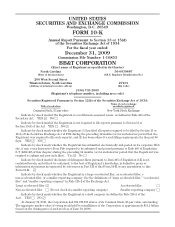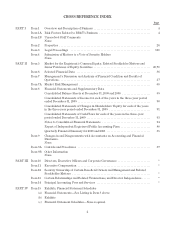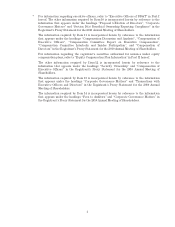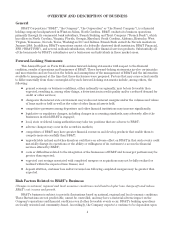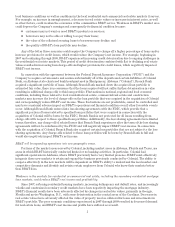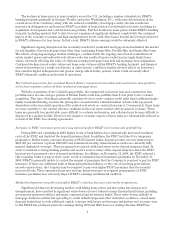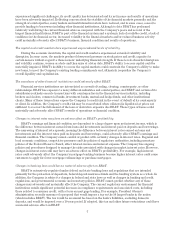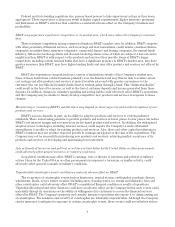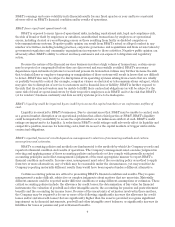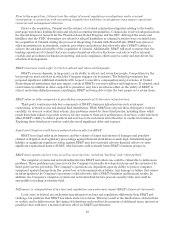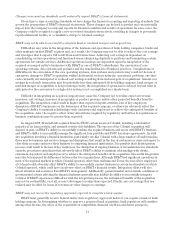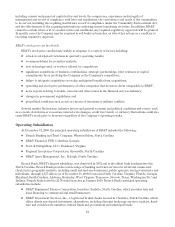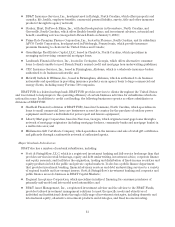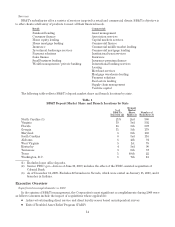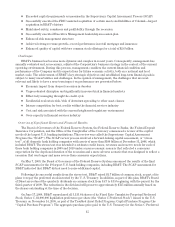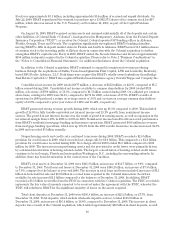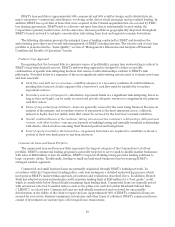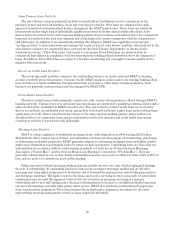BB&T 2009 Annual Report Download - page 11
Download and view the complete annual report
Please find page 11 of the 2009 BB&T annual report below. You can navigate through the pages in the report by either clicking on the pages listed below, or by using the keyword search tool below to find specific information within the annual report.Changes in accounting standards could materially impact BB&T’s financial statements.
From time to time accounting standards setters change the financial accounting and reporting standards that
govern the preparation of BB&T’s financial statements. These changes can be hard to predict and can materially
impact how the Company records and reports its financial condition and results of operations. In some cases, the
Company could be required to apply a new or revised standard retroactively, resulting in changes to previously
reported financial results, or a cumulative charge to retained earnings.
BB&T may not be able to successfully integrate bank or nonbank mergers and acquisitions.
Difficulties may arise in the integration of the business and operations of bank holding companies, banks and
other nonbank entities BB&T acquires and, as a result, the Company may not be able to achieve the cost savings
and synergies that it expects will result from such transactions. Achieving cost savings is dependent on
consolidating certain operational and functional areas, eliminating duplicative positions and terminating certain
agreements for outside services. Additional operational savings are dependent upon the integration of the
acquired or merged entity’s businesses with BB&T or one of BB&T’s subsidiaries, the conversion of core
operating systems, data systems and products and the standardization of business practices. Complications or
difficulties in the conversion of the core operating systems, data systems and products may result in the loss of
customers, damage to BB&T’s reputation within the financial services industry, operational problems, one-time
costs currently not anticipated or reduced cost savings resulting from such mergers or acquisitions. Annual cost
savings in each such transaction may be materially less than anticipated if the holding company, bank merger or
nonbank merger or acquisition is delayed unexpectedly, the integration of operations is delayed beyond what is
anticipated or the conversion to a single data system is not accomplished on a timely basis.
Difficulty in integrating an acquired company may cause the Company not to realize expected revenue
increases, cost savings, increases in geographic or product presence and/or other projected benefits from the
acquisition. The integration could result in higher than expected deposit attrition, loss of key employees,
disruption of BB&T’s businesses or the businesses of the acquired company, or otherwise adversely affect the
Company’s ability to maintain relationships with customers and employees or achieve the anticipated benefits of
the acquisition. Also, the negative effect of any divestitures required by regulatory authorities in acquisitions or
business combinations may be greater than expected.
In August 2009, Branch Bank acquired from the FDIC certain assets of Colonial, including a substantial
majority of its loan portfolio, and assumed certain of its liabilities. The success of the Colonial acquisition will
depend, in part, on BB&T’s ability to successfully combine the acquired business and assets with BB&T’s business
and BB&T’s ability to successfully manage the significant loan portfolio and FDIC loss share agreements. As with
any acquisition involving a financial institution, particularly one like Colonial with a large number of bank branches,
there may be business and service changes and disruptions that result in the loss of customers or cause customers to
close their accounts and move their business to competing financial institutions. It is possible that the integration
process could result in the loss of key employees, the disruption of ongoing business, or inconsistencies in standards,
controls, procedures and policies that adversely affect BB&T’s ability to maintain relationships with clients,
customers, depositors and employees or to achieve the anticipated benefits of the acquisition. Successful integration
may also be hampered by differences between the two organizations. Although BB&T had significant operations in
most of the regional markets in which Colonial operated, other than Alabama and Texas, the loss of key employees
of Colonial could adversely affect BB&T’s ability to successfully conduct business in certain local markets in which
Colonial operated, which could have an adverse effect on BB&T’s financial results. Integration efforts will also
divert attention and resources from BB&T’s management. Additionally, general market and economic conditions or
governmental actions affecting the financial industry generally may inhibit the ability to successfully integrate
Colonial. If BB&T experiences difficulties with the integration process, the anticipated benefits of the acquisition
may not be realized fully, or at all, or may take longer to realize than expected. Finally, any cost savings that are
realized may be offset by losses in revenues or other charges to earnings.
BB&T may not receive the regulatory approvals required to complete a bank merger.
BB&T must generally receive federal and/or state regulatory approvals before it can acquire a bank or bank
holding company. In determining whether to approve a proposed bank acquisition, bank regulators will consider,
among other factors, the effect of the acquisition on competition, financial condition and future prospects,
11

